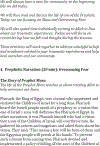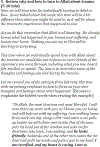Islamic Trauma Healing: Integrating Faith and Empirically Supported Principles in a Community-Based Program
- PMID: 34025104
- PMCID: PMC8136181
- DOI: 10.1016/j.cbpra.2020.10.005
Islamic Trauma Healing: Integrating Faith and Empirically Supported Principles in a Community-Based Program
Abstract
Access to adequate, much less state-of-the-art, mental health care is a global problem. Natural disasters, civil war, and terrorist conflict have forcibly displaced millions of Muslims and have resulted in a remarkable level of individual and communitywide trauma exposure. As a result, many are at risk for posttraumatic stress and other trauma-related disorders. Many religiously oriented Muslims traditionally rely on Islamic principles and teachings, as well as their community, to cope with and address trauma-related distress. Islamic Trauma Healing is a six-session, lay-led group intervention developed within a Somali Muslim community that integrates evidence-based trauma-focused cognitive-behavioral therapy principles with cultural and religious practices aimed to enhance uptake and create an easily up-scalable intervention for a wide range of trauma. In sessions, narratives of prophets who have undergone trauma (e.g., Prophet Ayyub, faith during hard times) present Islamic principles and facilitate cognitive shifts. Group members spend individual time turning to Allah in dua (i.e., informal prayer), focused on exposure to trauma memories. Program themes arc across suffering to healing to growth following trauma. This paper describes the core theoretical principles and methods in the Islamic Trauma Healing program. We also describe leader perspectives and the program's train-the-trainer model, in which lay leaders are trained to further disseminate the program and allow Islamic Trauma Healing to be owned and sustained by the Muslim community.
Keywords: Islam; PTSD; cognitive-behavioral therapy; lay leader; refugee; trauma.
Similar articles
-
Reaching the Unreached: Bridging Islam and Science to Treat the Mental Wounds of War.Front Psychiatry. 2021 Jun 2;12:599293. doi: 10.3389/fpsyt.2021.599293. eCollection 2021. Front Psychiatry. 2021. PMID: 34149468 Free PMC article.
-
Lay-Led Intervention for War and Refugee Trauma: A Randomized Clinical Trial.JAMA Netw Open. 2024 Aug 1;7(8):e2429661. doi: 10.1001/jamanetworkopen.2024.29661. JAMA Netw Open. 2024. PMID: 39186273 Free PMC article. Clinical Trial.
-
Islamic trauma healing (ITH): A scalable, community-based program for trauma: Cluster randomized control trial design and method.Contemp Clin Trials Commun. 2023 Dec 10;37:101237. doi: 10.1016/j.conctc.2023.101237. eCollection 2024 Feb. Contemp Clin Trials Commun. 2023. PMID: 38222876 Free PMC article.
-
The crescent and Islam: healing, nursing and the spiritual dimension. Some considerations towards an understanding of the Islamic perspectives on caring.J Adv Nurs. 2000 Dec;32(6):1476-84. doi: 10.1046/j.1365-2648.2000.01614.x. J Adv Nurs. 2000. PMID: 11136416 Review.
-
Vaccine hesitancy within the Muslim community: Islamic faith and public health perspectives.Hum Vaccin Immunother. 2023 Dec 31;19(1):2190716. doi: 10.1080/21645515.2023.2190716. Epub 2023 Mar 13. Hum Vaccin Immunother. 2023. PMID: 36914409 Free PMC article. Review.
Cited by
-
Post-traumatic stress disorder: evolving conceptualization and evidence, and future research directions.World Psychiatry. 2025 Feb;24(1):52-80. doi: 10.1002/wps.21269. World Psychiatry. 2025. PMID: 39810662 Free PMC article.
-
Reaching the Unreached: Bridging Islam and Science to Treat the Mental Wounds of War.Front Psychiatry. 2021 Jun 2;12:599293. doi: 10.3389/fpsyt.2021.599293. eCollection 2021. Front Psychiatry. 2021. PMID: 34149468 Free PMC article.
-
Muhammadiyah's COVID-19: Combining Islamic, Psychological, and Medical Approach in Indonesia.J Relig Health. 2025 Feb 20. doi: 10.1007/s10943-024-02194-2. Online ahead of print. J Relig Health. 2025. PMID: 39979660
-
Perceived Need for a Faith-Based Trauma-Focused Treatment in a Sample of Forcibly Displaced Muslims.Cogent Ment Health. 2024;3(1):1-18. doi: 10.1080/28324765.2024.2305417. Epub 2024 Jan 24. Cogent Ment Health. 2024. PMID: 38550624 Free PMC article.
-
Understanding ethnic minority service user experiences of being invited to and attending group pain programmes: A qualitative service evaluation.Br J Pain. 2023 Feb;17(1):58-70. doi: 10.1177/20494637221129196. Epub 2022 Sep 21. Br J Pain. 2023. PMID: 36815070 Free PMC article.
References
-
- Abu-Raiya H, & Pargament KI. (2011). Empirically based psychology of Islam: Summary and critique of the literature. Mental Health, Religion and Culture, 14(2), 93–115. doi:10.1080/13674670903426482 - DOI
-
- Aflakseir A, & Coleman PG (2009). The influence of religious coping on the mental health of disabled Iranian war veterans. Mental Health, Religion and Culture, 12(2), 175–190. doi:10.1080/13674670802428563 - DOI
-
- Ai AL, Tice TN, Huang B, & Ishisaka A (2005). Wartime faith-based reactions among traumatized Kosovar and Bosnian refugees in the United States. Mental Health, Religion and Culture, 8(4), 291–308. doi:10.1080/13674670412331304357 - DOI
Grants and funding
LinkOut - more resources
Full Text Sources
Other Literature Sources
Research Materials


